West of Eden
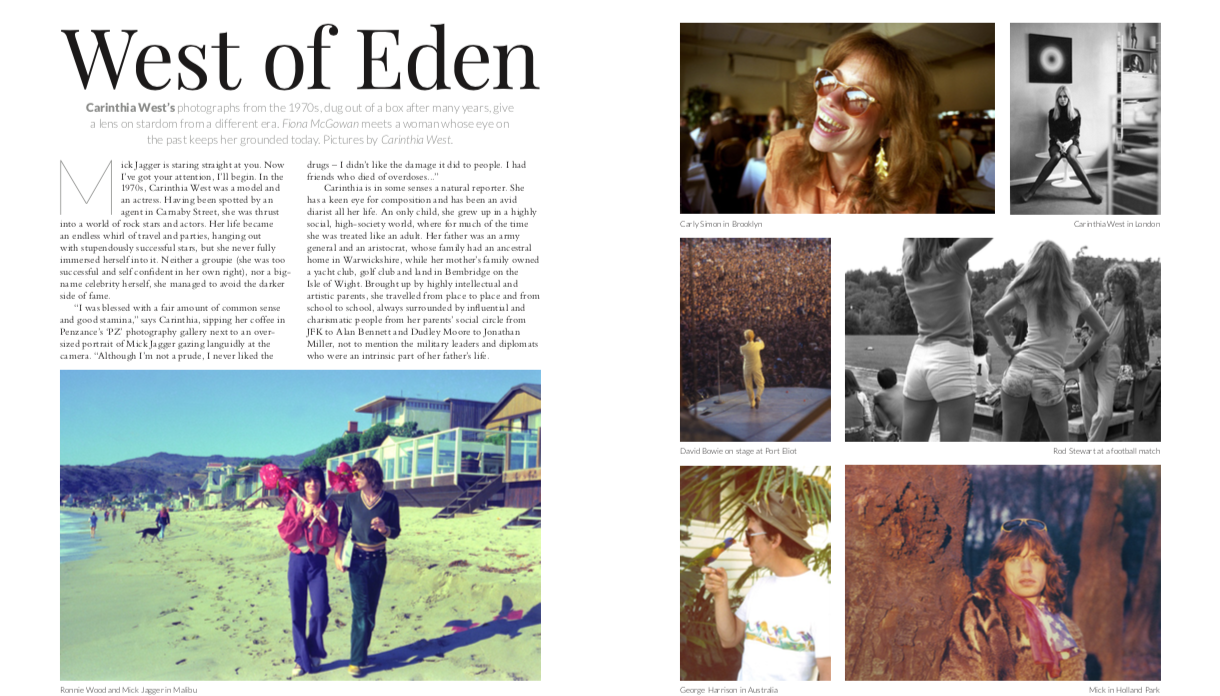
Mick Jagger is staring straight at you. Now I’ve got your attention, I’ll begin. In the 1970s, Carinthia West was a model and an actress. Having been spotted by an agent in Carnaby Street, she was thrust into a world of rock stars and actors. Her life became
an endless whirl of travel and parties, hanging out with stupendously successful stars, but she never fully immersed herself into it. Neither a groupie (she was too successful and self confident in her own right), nor a big- name celebrity herself, she managed to avoid the darker side of fame.
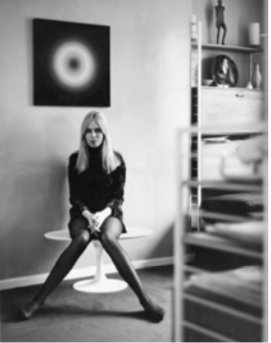
“I was blessed with a fair amount of common sense and good stamina,” says Carinthia, sipping her coffee in Penzance’s ‘PZ’ photography gallery next to an over-sized portrait of Mick Jagger gazing languidly at the camera. “Although I’m not a prude, I never liked the drugs – I didn’t like the damage it did to people. I had friends who died of overdoses...”
Carinthia is in some senses a natural reporter. She has a keen eye for composition and has been an avid diarist all her life. An only child, she grew up in a highly social, high-society world, where, for much of the time, she was treated like an adult. Her father was an army general and an aristocrat, whose family had an ancestral home in Warwickshire, while her mother’s family owned a yacht club, golf club and land in Bembridge on the Isle of Wight. Brought up by highly intellectual and artistic parents, she travelled from place to place and from school to school, always surrounded by influential and charismatic people from her parents’ social circle – from JFK to Alan Bennett and Dudley Moore to Jonathan Miller, not to mention the military leaders and diplomats who were an intrinsic part of her father’s life.
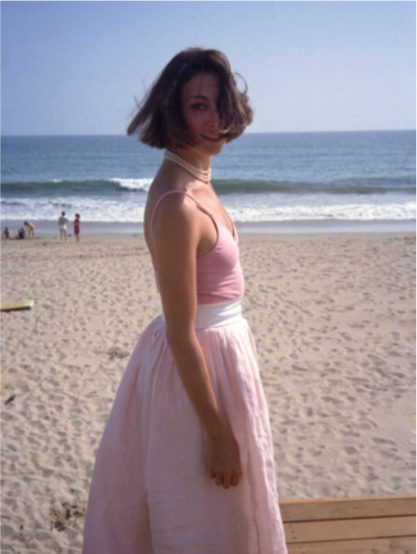
Coming out of a childhood like this and launched as a debutante into a scene of sex, drugs and rock and roll would have required some stamina, so it was lucky that Carinthia was no guileless child. Perhaps in some way to create a protective barrier between her and the hedonistic world into which she was catapulted, she became attached to her Canon camera. It went everywhere with her: from the beach-homes of Hollywood stars to the sitting rooms of rock musicians. And it was in this way that the young actress found a new kind of diary. Unlike in today’s world of selfies and self promotion, there was a kind of innocence about celebrity in the 70s. Looking at Carinthia’s collection of images, there’s an honesty and unposed nature that can only be captured by someone who is close to the subject – she talks a lot about empathy in her work. It is this nature, one assumes, that led the likes of Mick Jagger, Ronnie Wood, Jenny Agutter and Angelica Huston to act as though the camera lens was just an extension of the friend who stood behind it.
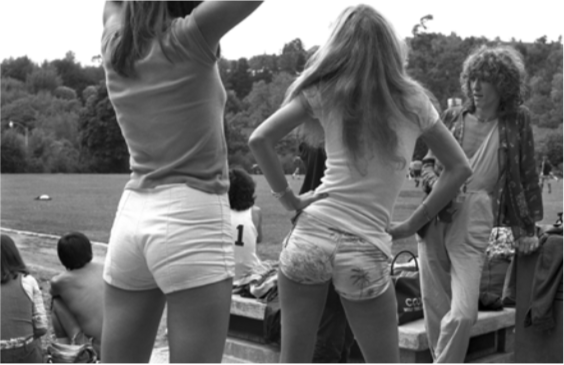
Surrounded as she was by the works of art that her mother collected almost obsessively – from Lowry to Peter Sedgley – she didn’t really rate her own photographs. They ended up consigned to a box of negatives, while Carinthia pursued her career in Hollywood, and modelling on the pages of glossy magazines. Spending the halcyon years of the 70s living in LA, it was her mother’s debilitating stroke that brought her back to London, and into a job working on the newly launched UK Marie Claire magazine. Another phase of her career began, and she found that she had a natural talent as a journalist, particularly as an interviewer. Her exposure to the world of fame and celebrity enabled her to relate to her subjects candidly and as a friend: “I never had a list of questions, I just got people to talk,” she explains. The magazines loved her easy intimacy with her subjects. Tatler, Vogue, Harper’s Bazaar all hankered for her work and, after years of being directed in movies and photo-shoots, she found she loved it, too. “Being a photographer and a writer – it took me where I wanted to go when I wanted to go. I’d had enough of waiting around for a week because some director couldn’t decide when to do the shoot.”
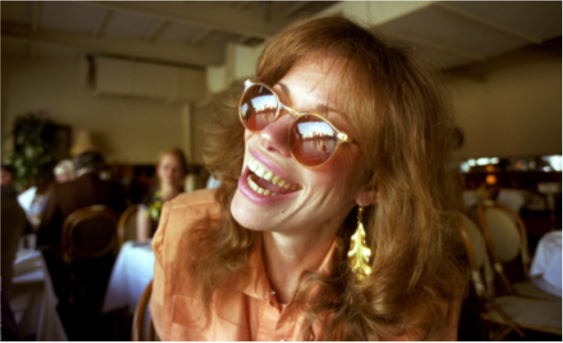
Fame and celebrity is a theme that is paramount in Carinthia’s photography – her personal and up-close images so alluring in capturing people who hit stardom
in a very different era. The naturalness of the images is particularly intriguing today, when celebrities are so self-aware, self-conscious and media-savvy. “I’ve seen fame
at very close quarters,” she says. “The people that I know can handle it very well, because we were brought up in a time when fame didn’t represent what it represents now. Now, we’re all famous for five minutes – the reality shows, Instagram... We live in this terrifying age where so many people are so aggressively ego-orientated.” Carinthia has seen the likes of The Stones, David Bowie and Pink Floyd live through the glory years in their youth, and keep on going. “It’s not just about being fabulous, you know – they constantly work. Rod Stewart, Mick, you name it. They exercise, they keep at it. It does get harder as you get older. To keep fit and keep on top of things.”
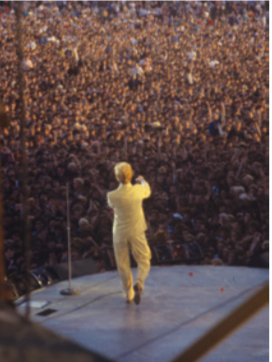
She has also lost many close friends in recent years – from David Bowie to Peregrine St Germains and L’Wren Scott. “You become very aware of your own mortality,” she says, showing me a photograph she took of Bowie and Peregrine looking relaxed among friends in the grounds of a country house. In spite of the starriness of her social circle (every other sentence is an unintentional name-drop: from David Gilmore inviting her to his recent concert in Pompeii to Neil Young throwing her 32nd birthday party at his beachside house in Malibu’s Zuma Beach), she is both grounded and straight-talking. Having just spent some time back in California, exhibiting her photographs, she is refreshingly outspoken on the subject of ageing: “I find it very tragic to see women having facelifts. I know it’s a personal choice but it makes me want to say ‘just face up to who you are! Keep yourself as well and healthy as you can. Don’t try and fight it – embrace it!’”
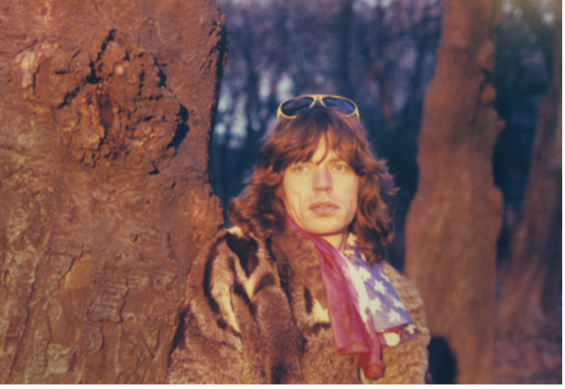
Exuding positivity and confidence, she has no regrets about moving forward – last year, she relocated, lock, stock and barrel, from Notting Hill to Lelant in West Cornwall. Choosing a light, airy, modernist house designed by renowned local architect Barrie Briscoe, she has settled on the edge of an estuary: “It’s such a fantastic thing to see a flock of geese fly overhead or a heron swoop down, or even a seagull,” she says, her eyes lighting up. “The house that I’ve bought here is my absolute haven. To me, it’s just heaven.” In spite of dire warnings from friends in London and around the world, who were convinced that she would be lonely and isolated, she told herself, ‘If you don’t do something now – in your later life – then you never will.’ Always drawn to the sea, since the long childhood holidays spent on the Isle of Wight, she was tired of urban life. “I left London because I don’t like living in big cities any more. I lived in LA for 10 years and then in London. I don’t like crowds, I don’t like noise, but I do like intellectual stimulation.” She gets plenty of that – if she’s not up visiting friends in London, she’s jetting around, from Copenhagen to Italy (“I’d move there in a heartbeat if I thought I could get over the bureaucracy”) and from Chicago to LA. But when she comes back to Cornwall, she has finally found an anchor. “One of the things I love about being here is that people are genuinely nice. I’ve met such charming, helpful people.”
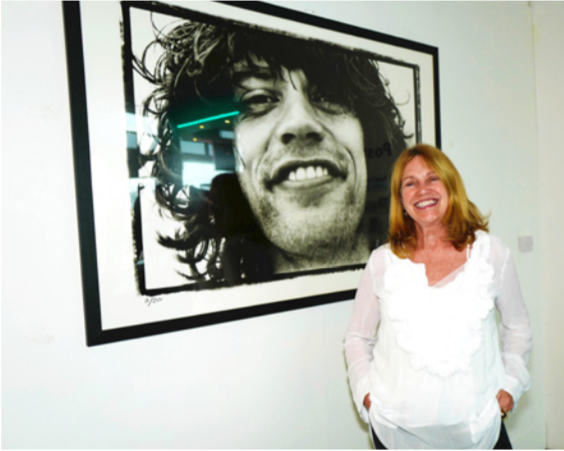
It seems as though Carinthia West has found the perfect life balance. She has a theory that we all have an ‘interior lake’ that is our true selves. “We all have a blueprint in our life. An internal lake of deep-seated beliefs and knowledge and questions. There are things that we don’t know about in our characters – probably even from babyhood.” It sounds as though she is describing the soul, and it is in Lelant that she finds the peace to connect with her soul. “Going back to the interior lake. You need at times to really draw from the well and allow things to happen in a quiet and peaceful way. You need time to reflect.” I imagine that a life lived in proximity to such intense, charismatic and often hedonistic characters would provide plenty of depth to that inner lake. I wonder if there may be an autobiography gestating on the edge of that peaceful Cornish bird sanctuary.
carinthiawest.com
